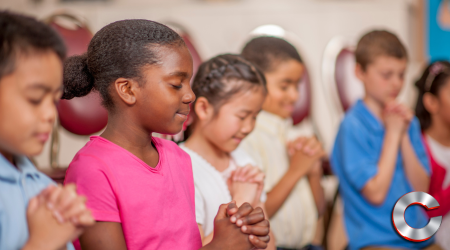We ask you, urgently: don't scroll past this
Dear readers, Catholic Online was de-platformed by Shopify for our pro-life beliefs. They shut down our Catholic Online, Catholic Online School, Prayer Candles, and Catholic Online Learning Resources essential faith tools serving over 1.4 million students and millions of families worldwide. Our founders, now in their 70's, just gave their entire life savings to protect this mission. But fewer than 2% of readers donate. If everyone gave just $5, the cost of a coffee, we could rebuild stronger and keep Catholic education free for all. Stand with us in faith. Thank you.Help Now >
The Day Prayer Left the Classroom: Why It Should Never Have Happened
FREE Catholic Classes
The removal of prayer from the U.S. public school system marked a turning point in American society. For centuries, prayer and faith had been integral to the nation's cultural and educational framework. Yet, in 1962, the Supreme Court's landmark decision in Engel v. Vitale declared organized prayer in public schools unconstitutional, citing a violation of the Establishment Clause of the First Amendment. This decision has sparked debate ever since--was it a necessary protection of religious freedom, or did it create a moral void in education?

Highlights
12/11/2024 (1 year ago)
Published in Living Faith
Keywords: Prayer, School, United States
The Backstory: Engel v. Vitale
The case originated in New York, where a simple, non-denominational prayer was recited in schools:
"Almighty God, we acknowledge our dependence upon Thee, and we beg Thy blessings upon us, our parents, our teachers, and our Country."
Despite its generic nature, a group of parents argued that even voluntary recitation of this prayer constituted government endorsement of religion. The Supreme Court agreed, ruling that the practice violated the Establishment Clause.
This decision, followed by Abington School District v. Schempp (1963), which prohibited Bible readings in schools, effectively removed structured religious activities from public education. While proponents hailed these rulings as a victory for religious neutrality, others saw them as the first steps toward secularizing public life.
The Impact: A Moral and Cultural Shift
The removal of prayer from schools signaled more than just a legal change--it represented a cultural shift. For many, it symbolized the abandonment of shared moral and spiritual values that had guided previous generations. Schools were no longer places where children learned not only academics but also virtues like respect, responsibility, and reverence for higher principles.
Without prayer or religious frameworks, education became detached from moral foundations. This absence left a void often filled by moral relativism and a focus on individualism, coinciding with rising social challenges: increased rates of violence, drug abuse, and a general sense of societal disconnection.
Why It Should Never Have Happened
The argument against removing prayer is not about imposing religion but about recognizing its role in fostering a sense of community and shared purpose. Prayer, at its core, is an expression of gratitude, hope, and humility. Its presence in schools did not mandate belief; rather, it served as a gentle reminder of values that transcend individual interests.
Moreover, the prohibition of prayer often leads to a misunderstanding of the First Amendment. The Establishment Clause was designed to prevent the government from imposing a state religion--not to eliminate expressions of faith from public life. By banning prayer, the courts may have inadvertently restricted the free exercise of religion, the very right the Constitution seeks to protect.
Reclaiming Moral Foundations
Restoring prayer in schools does not mean forcing religious practice but creating space for reflection and values-based learning. A return to such practices could encourage empathy, gratitude, and moral clarity in students, addressing many of the challenges plaguing modern education.
The question is not whether prayer belongs in schools but whether we, as a society, are willing to acknowledge the importance of faith and moral guidance in shaping the next generation. By revisiting this debate, we may find that reintroducing prayer--or at least its underlying principles--can help heal the fractures in our educational system and society at large.
------------------------------------------------------------------------------------------
Your support makes stories like this possible!
Catholic Online is completely donor supported, allowing us to report on what truly is happening in the world, free of charge and uncensored. A donation to Catholic Online will ensure millions around the world can continue to come to our site to find the faith people are so desperately searching for in life.
Join the Movement
When you sign up below, you don't just join an email list - you're joining an entire movement for Free world class Catholic education.
Our Important Lenten Message - Please Watch
- Easter / Lent
- 5 Lenten Prayers
- Ash Wednesday
- 7 Morning Prayers
- Mysteries of the Rosary
- Litany of the Bl. Virgin Mary
- Popular Saints
- Popular Prayers
- Female Saints
- Saint Feast Days by Month
- Stations of the Cross
- St. Francis of Assisi
- St. Michael the Archangel
- The Apostles' Creed
- Unfailing Prayer to St. Anthony
- Pray the Rosary
![]()
Copyright 2026 Catholic Online. All materials contained on this site, whether written, audible or visual are the exclusive property of Catholic Online and are protected under U.S. and International copyright laws, © Copyright 2026 Catholic Online. Any unauthorized use, without prior written consent of Catholic Online is strictly forbidden and prohibited.
Catholic Online is a Project of Your Catholic Voice Foundation, a Not-for-Profit Corporation. Your Catholic Voice Foundation has been granted a recognition of tax exemption under Section 501(c)(3) of the Internal Revenue Code. Federal Tax Identification Number: 81-0596847. Your gift is tax-deductible as allowed by law.








